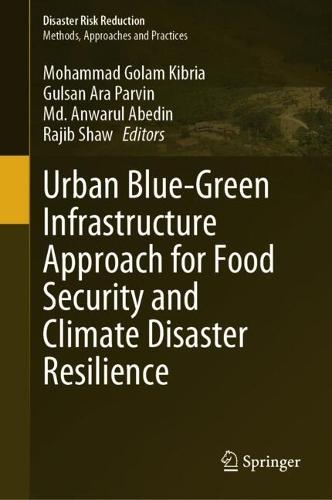Full Product Details
Author: Mohammad Golam Kibria ,
Gulsan Ara Parvin ,
Md. Anwarul Abedin ,
Rajib Shaw
Publisher: Springer Nature Switzerland AG
Imprint: Springer Nature Switzerland AG
ISBN: 9789819687459
ISBN 10: 9819687454
Pages: 308
Publication Date: 27 September 2025
Audience:
College/higher education
,
Professional and scholarly
,
Tertiary & Higher Education
,
Professional & Vocational
Format: Hardback
Publisher's Status: Active
Availability: Manufactured on demand

We will order this item for you from a manufactured on demand supplier.
Author Information
Dr. Mohammad Golam Kibria is an associate professor in the Department of Soil Science in Bangladesh Agricultural University, Bangladesh. He received his Ph.D. in soil fertility and plant nutrition from the University of Western Australia, Australia. After completing his Ph.D., his research focuses on urban agriculture, disaster risk reduction, climate change adaptation, integrated social aspects and soil health assessment under changing global environment. Dr. Kibria has also worked for the International Union for Conservation of Nature, Coalition for Disaster Resilient Infrastructure, Food and Agriculture Organization and Asia-Pacific Network for Global Change Research in different research projects focusing on climate disaster resilience. He is currently working in two different collaborative projects funded by the United States Agency for International Development and Asia-Pacific Network for Global Change Research, which focus on urban horticulture and climate induced loss assessment in rice production. Dr. Gulsan Ara Parvin is a researcher and instructor at the Collage of Policy Science, Ritsumeikan University, Japan. She worked for different graduate schools and research centers of Kyoto University, Japan, for about 12 years. She was also an associate professor at the Urban and Regional Planning Department, Bangladesh University of Engineering and Technology. She conducted her Ph.D. research at the Urban Engineering Department, the University of Tokyo. Her expertise includes disaster risk reduction and community resilience, social capital, women empowerment and microfinance in Bangladesh. She has published about 50 research papers in different journals and books. She has research and teaching experiences in Bangladesh, Japan, Malaysia, Thailand and USA. Dr. Md Anwarul Abedin is a professor and leader of Laboratory of Environment and Sustainable Development in the Department of Soil Science, Bangladesh Agricultural University, Bangladesh. He received his Ph.D. from Kyoto University, Japan. He was a postdoctoral researcher in Kyoto University and Northumbria University, UK. Dr. Abedin was awarded the esteemed Pan Asia Risk Reduction Fellowship by START. He has 19 years of teaching and research experiences in the field of agriculture, food safety and security, water resource management, solid waste management, environmental impact assessment, community-based adaptations and resilience mapping, climate change, disaster risk reduction, land use change and community participation. He has worked as a consultant with Food and Agriculture Organization, Japan International Cooperation Agency and International Union for Conservation of Nature, among others. He has served as an editorial board member and reviewer in many journals. Professor Rajib Shaw is a professor in the Graduate School of Media and Governance in Keio University, Japan. He is also a senior fellow of the Institute of Global Environmental Strategies (IGES) Japan, and the chairperson of the Sustainable Environment and Ecological Development Society (SEEDS) Asia and the Church World Service (CWS) Japan, two Japanese NGOs. He is a co-founder of a Delhi (India)-based social entrepreneur startup, the Resilience Innovation Knowledge Academy (RIKA). Earlier, he was the executive director of the Integrated Research on Disaster Risk (IRDR) and was a professor in Kyoto University. His expertise includes disaster governance, community-based disaster risk management, climate change adaptation, urban risk management and disaster and environmental education. Professor Shaw was the chair of the United Nations Science Technology Advisory Group (STAG) for disaster risk reduction and currently is the co-chair of the AsiaPacific Science Technology Academic Advisory Group (APSTAAG).



